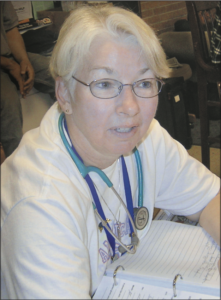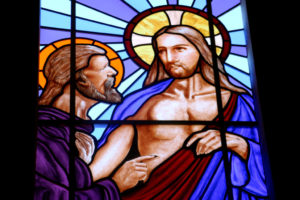
The great cry of the human heart is to be loved.
This deep longing echoes down through the centuries in every heart that beats, perhaps even more so in this digital age of isolation. Ironically, the word digital has taken on a different meaning since the dawn of computers. The Latin root of digital actually means “pertaining to the fingers.” God made us and knows we humans have a need to be touched.

I saw this phenomenon come to life in an interview many years ago with Nurse Judi, a woman who has devoted herself to serving the homeless, addressing not just their need for medical attention but also their longing to be loved. She told me she gently places her hand on the arm of each person she assists. One man’s eyes glittered with tears as she laid her hand on him. “No one has touched me in six months,” he told her.
Nurse Judi finds meaning in serving the homeless, finding Christ disguised beneath ragged clothes and sunburned faces. And in turn, the homeless encounter the love of God through her tender, hands-on care.
Our Lord Jesus knows of our need to experience His love through touch and perhaps that’s one reason every sacrament involves a physical action. Whether it’s the laying on of hands, the pouring of water, the anointing with holy oils or receiving His most precious Body and Blood, we “taste and see” the goodness of the Lord with our bodies through the action of the priest or deacon.

The account of St. Thomas the Apostle’s declaration of faith as told in the Gospel of John demonstrates this need for touch rather poignantly. St. Thomas refused to believe that Jesus had risen from the dead, declaring that he would only believe if he could see the mark of the nails in Christ’s hands and place his finger into the wounds. When Jesus invited Thomas to touch and believe, his response was, “My Lord and my God.”
Each of us is called to these radical moments of grace, to discovering the love of God that comes to us through the sacraments but also through human interaction.
A few years ago, I experienced one such moment when I had dinner with Fr. Douglas Bazi. The Chaldean Catholic priest survived nine days of torture at the hands of jihadists in his native Iraq. Early on in the ordeal, they took a hammer to his teeth, telling him chillingly, “You have many teeth — and we have all night.”
The traditional Chaldean greeting or farewell calls for a kiss to be bestowed on both cheeks. As I said goodbye to this heroic witness for Christ, all I could think was, “This is the face that took the blows of the hammer for You, my Lord and my God.” And while I’d watched videos about Fr. Bazi on YouTube and Googled him to find out more about his experiences, nothing could compare to actually looking him in the eye and touching his face.
So, what to do in a digital age when actual human interaction is becoming increasingly rare? I’ll be the first one to admit that if there’s one thing I relish after a long day at work, it’s curling up with my Kindle and losing myself in a novel. But will I experience God’s love there? Of course not. And that is precisely why we have to intentionally, daily, frequently break away from virtual reality and step into the arms of God’s love. We’ll find His undying love in the sacraments, in Scripture and in the human persons all around us longing to be loved and who reveal God’s love to us. It is love alone — Love Himself — that satisfies the deepest longing of the human heart.
St. Thomas the Apostle was forever changed when he placed his hands on the wounds of Christ. May each of us reach out to the wounded among us to share and experience the immensity of God’s love.
Related







